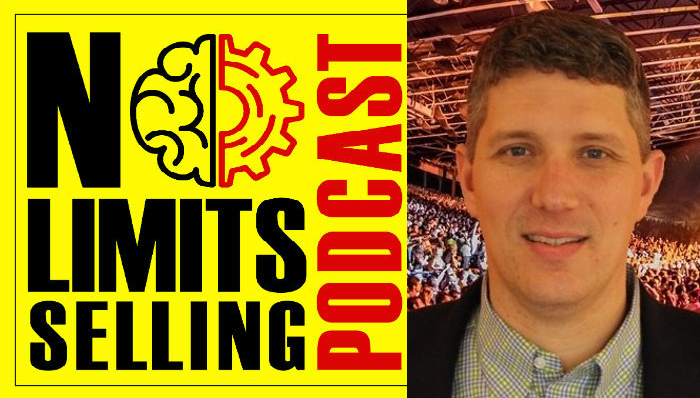Staying Ahead of the Curve by Jared Marmen
On Episode 20 of The No Limits Selling Podcast, we have Jared Marmen (@jsmarmen), the founder of Barttron Inc. makers of the Chord Collar, a kind, smart Collar that will make the shock collar obsolete. He first began drawing up plans for Chord as a graduate engineering student at Johns Hopkins 2003 and never completely put it down. Before launching Chord, he was an engineer and product team lead for several military R&D projects, growing one $70k federal grant into a technology product line that generated a 24x return on investment.
Jared has a BS in physics from St. Mary’s College of MD, which is where he fell in love with his roommate's yellow lab Homer and later adopted Homer’s nephew Bart, the company's namesake. Jared has an MS in Electrical and Computer Engineering from Johns Hopkins, an old yellow lab named Nelson, and a very special puppy named Sprinkles. Barttron won the big check at the Accelerate Baltimore pitch night in April 2017 and launched a pre-order crowdfunding campaign on Indiegogo in July 2018.
Podcast Highlights:
- Know your customer
- Build your team from superstars from your past jobs
- You have to hit a big milestone in the first 48hrs when crowdfunding

Contact Jared:
[EDITOR’S NOTE: This podcast is sponsored by No Limits Selling. It is a fun, fast-paced podcast that delivers hard-fought business advice that you can implement today to improve your sales and performance]
Interested In Our Real Estate Coaching Services? Explore Our Website: Link
Feeling Not Well Today? You Can Use Our Mindset Boosters App To amp Up Your Mood: Link
Find us on Social Media:
LinkedIn | Facebook community | Instagram
Like what do you listen to? Subscribe to our podcast!
Ready to become fearless? We can help you become fearless in 60 days so you accomplish more in your career Schedule A 15 min Call with Umar
Summary
Introduction
The podcast begins with an introduction of the guest, Jared Marmen, who is a successful entrepreneur and an expert in the field of technology. He is the founder of Chord, a company that specializes in creating advanced technology solutions for businesses. Jared shares his journey of how he started his career in technology and the challenges he faced along the way.
Jared's Journey in Technology
Jared discusses his early interest in technology, which began when he was a child. He talks about his first experiences with computers and how he was fascinated by the endless possibilities they presented. He also shares how he taught himself to code and how this skill has been instrumental in his success.
Founding of Chord
The podcast then delves into the founding of Chord. Jared explains the motivation behind starting his own company and the challenges he faced in the early stages. He discusses the importance of having a clear vision and staying committed to it, even in the face of adversity.
Chord's Success and Impact
Jared shares the success of Chord and its impact on businesses. He explains how Chord's advanced technology solutions have helped businesses streamline their operations and increase efficiency. He also discusses the importance of innovation and staying ahead of the curve in the rapidly evolving tech industry.
Advice for Aspiring Entrepreneurs
Towards the end of the podcast, Jared offers advice for aspiring entrepreneurs. He emphasizes the importance of perseverance, learning from failures, and having a passion for what you do. He encourages listeners to take risks and to not be afraid of making mistakes, as these are often the stepping stones to success.
Conclusion
In this insightful podcast, Jared Marmen, a self-taught technology expert and successful entrepreneur, shares his journey from a childhood fascination with computers to founding Chord, a company that provides advanced technology solutions for businesses. Despite the challenges he faced, Jared's unwavering commitment to his vision has led to Chord's success in streamlining business operations and fostering innovation in the tech industry.
Offering valuable advice to aspiring entrepreneurs, Jared emphasizes the importance of perseverance, learning from failures, and having a passion for one's work. He concludes with an optimistic outlook on the future of technology and its transformative potential, encouraging listeners to embrace the opportunities it presents.
Questions & Answers
Who is Jared Marmen and what is his contribution to the tech industry?
What is Chord and how has it impacted businesses?
What challenges did Jared Marmen face when starting Chord?
What advice does Jared Marmen offer to aspiring entrepreneurs?
What is Jared Marmen's vision for the future of technology?
How can one stay ahead of the curve in the rapidly evolving tech industry according to Jared Marmen?
Don’t miss this opportunity to transform your real estate career with one-on-one coaching. As an experienced real estate coach, I, Umar Hameed, am dedicated to helping you unlock your full potential and achieve your real estate goals. To learn more about who am I and my clients ↓
If you’re ready to take the next step, book an appointment with me today and begin your journey toward success in the real estate industry.
